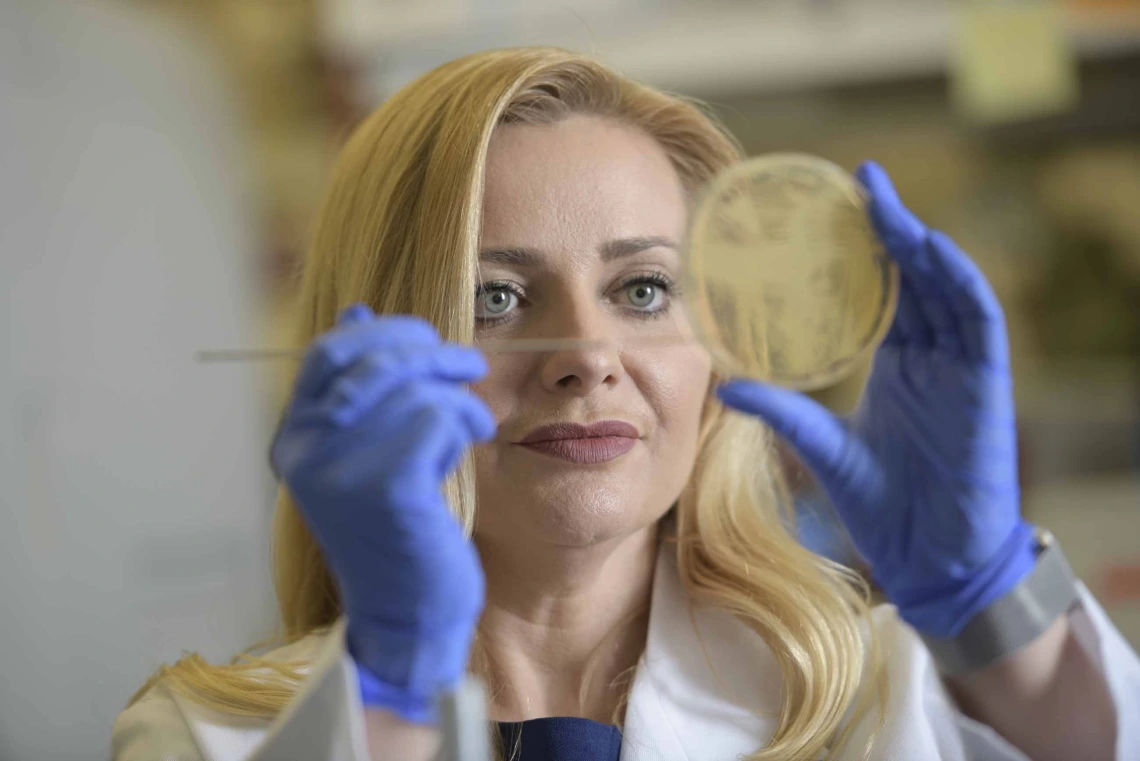AZBio Awards to honor two U of A faculty members, startup company
Melissa Herbst-Kralovetz, LifeSpan Digital Health and Dr. Eric Reiman are being recognized by the Arizona Bioindustry Association.

Melissa Herbst-Kralovetz is a professor of basic medical sciences and obstetrics and gynecology at the U of A College of Medicine – Phoenix.
Photo courtesy of the U of A College of Medicine – Phoenix
The Arizona Bioindustry Association will recognize two University of Arizona faculty members and a startup company that originated at the university at its annual award banquet Oct. 15 at the Phoenix Convention Center in Phoenix.
Melissa Herbst-Kralovetz, professor of basic medical sciences, as well as obstetrics and gynecology at the U of A College of Medicine – Phoenix, will receive the Biosciences Researcher of the Year award. LifeSpan Digital Health, a startup launched through Tech Launch Arizona, the U of A’s commercialization office, will be presented with a Fast Lane award. And Dr. Eric Reiman, associate research professor of psychiatry at the College of Medicine – Phoenix and chief executive officer at the Banner Alzheimer’s Institutes, will receive the Pioneer Award for Lifetime Achievement.
“The Bioscience Researcher of the Year and Pioneer Award for Lifetime Achievement awards are two of the highest honors researchers in Arizona can aspire to, and I am thankful to the Arizona Bioindustry Association for recognizing the industry-leading efforts and accomplishments of our faculty members,” said Jennifer Barton, interim vice provost for health programs at the U of A Health Sciences. “Likewise, the recognition of LifeSpan Digital Health with a Fast Lane award highlights the efforts of the many health care-related startups at U of A to deliver translational research from the lab to the clinic.”
The AZBio Awards honor leaders from across the state who illustrate the depth and breadth of Arizona’s life science industry.
“What inspires me most is seeing how our researchers and entrepreneurs turn bold ideas into meaningful change,” said Tomás Díaz de la Rubia, senior vice president for research and partnerships. “This kind of impact on health and human potential is exactly the kind of outcome a public research university should strive to achieve.”
Biosciences Researcher of the Year: Melissa Herbst-Kralovetz, PhD
Herbst-Kralovetz, director of the Women’s Health Microbiome Initiative at the College of Medicine – Phoenix, has a long-standing interest in women’s health. Her lab is focused on understanding the microbiome and host-microbe interactions in the female reproductive tract as it relates to gynecologic and oncologic health outcomes. Additionally, she works to provide diagnostics for women in underserved populations, including through the Native American Cancer Prevention Program.
She has been funded by the National Institutes of Health and foundations, including the Flinn Foundation, the Alternatives Research and Development Foundation and most recently the Mary Kay Foundation, to study cervical and endometrial cancer. Herbst-Kralovetz utilizes clinical and preclinical models and an innovative 3-D bioreactor system to study human epithelial and innate immune responses to pathogens. In addition, she has recently moved into other -omics technologies, including immunoproteomics and metabolomics.
Herbst-Kralovetz has a long-standing interest in enhancing women’s health outcomes through translational research and is creating an at-home gynecologic testing system for early detection of gynecologic conditions such as endometrial cancer, endometriosis and adenomyosis. The test pairs non-invasive sampling techniques with advanced biomarker analysis developed through Herbst-Kralovetz’s research.
Working with Tech Launch Arizona, Herbst-Kralovetz received multiple grants to advance her at-home gynecologic testing system research, including a Flinn Seed Grant and an Arizona Biomedical Research Commission grant. She completed Tech Launch Arizona’s NSF I-Corps program, during which she focused on customer discovery and feedback to dial in strategies for successfully moving the innovation from the lab to the marketplace.
AZBio Fast Track Award: LifeSpan Digital Health
Since its founding last year, LifeSpan Digital Health has made strides in its mission to enhance health care work environments and alleviate burnout among physicians and health care professionals.
Dr. Sam Keim, professor and head of the Department of Emergency Medicine at the U of A College of Medicine – Tucson, applied more than two decades of research, starting with medical residents in high-intensity specialties such as emergency medicine, to craft the software platform emPower+. The evidence-based program is a real-time solution to support physician and nurse wellness in the workplace.
Keim worked with Tech Launch Arizona to commercialize the technology and license it to LifeSpan Digital Health, led by CEO Jeff Cary. LifeSpan Digital Health has established strategic partnerships across the U of A and its clinical partners, including collaborations with the College of Nursing, the Eller College of Management and Banner – University Medical Center. The company has also established pilot partnerships at Northwestern University Medical Center, New York-Presbyterian Brooklyn Methodist Hospital, Atrium Health Carolinas Medical Center and the University of Texas, Houston. LifeSpan Digital Health projects positive annual recurring revenue by 2026.
AZBio Pioneer Award for Lifetime Achievement: Eric M. Reiman, MD

Dr. Eric Reiman is an associate research professor of psychiatry at the College of Medicine – Phoenix and chief executive officer at Banner Alzheimer’s Institutes in Phoenix and Tucson.
The Pioneer Award is the highest honor awarded by Arizona’s bioscience community and is extended to an Arizonan whose body of work has made life better for people at home and around the world. Reiman, a renowned leader in Alzheimer’s research and patient care, oversees and spearheads initiatives at Banner Alzheimer’s Institutes in Phoenix and Tucson and Banner Sun Health Research Institute in Sun City.
Reiman and his colleagues established the Alzheimer’s Prevention Initiative, which includes public-private partnerships, prevention trials and biomarker development programs in cognitively unimpaired persons at high risk for Alzheimer’s disease. Large registries and innovative programs to support enrollment in these and other studies, precedent-setting trial data and biological sample sharing agreements, and other efforts to help find and support the approval, affordability and availability of prevention therapies as soon as possible are also focus areas of this initiative.

